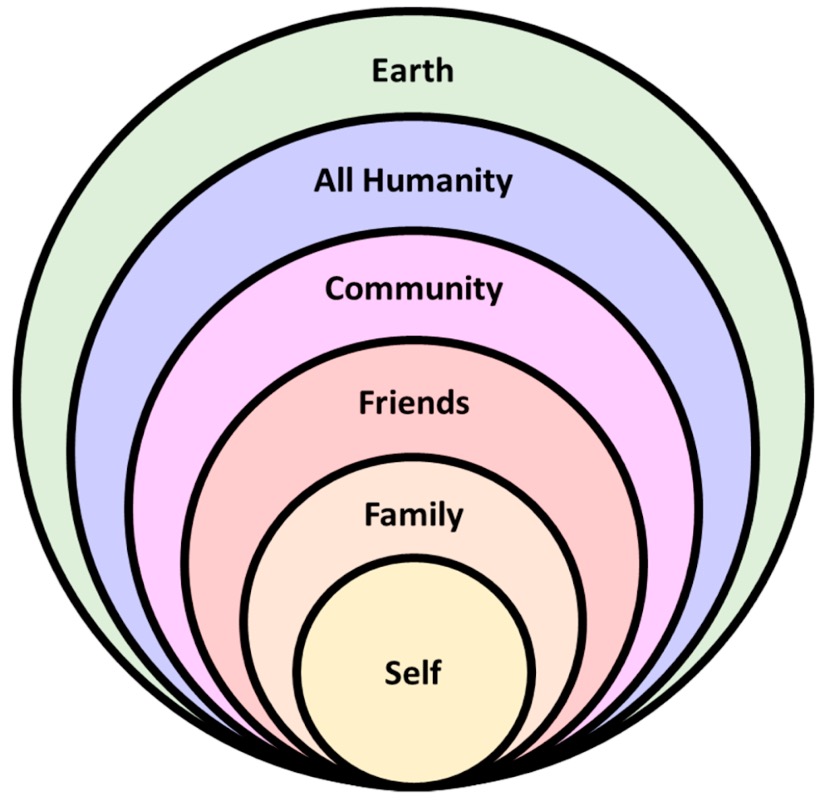When I first described Stoicism here in July 2023, I hadn’t yet explored the cosmopolitanism view and the practice of Oikeiōsis. This more in-depth look at Stoicism only enhances the philosophy’s credibility.
While preparing for a lighting talk at this years Stoicon, I thought I would flesh out this what it means to live a Stoic cosmopolitan way of life.
I’ve observed that people are often first drawn to Stoicism because of the immediate psychological benefits it promises. At the beginning of their Stoic journey, most are eager to know: what can this do for me?
That was certainly the case for me. I was pulled in by the promise of learning how to manage my emotions, develop discipline, cultivate balance, and build courage in the face of challenges. If you’re exploring Stoicism, chances are these are some of the qualities you’re hoping to strengthen too. And that’s perfectly natural. This self-centred version of Stoicism is not only valid but also powerful. It gives us practical tools to navigate life with more resilience and calm. It helped me immensely, and it will help you too.
But what often surprises people—and what surprised me—is that Stoicism doesn’t stop there. While the initial draw may be about the self, one of the most profound aspects of the philosophy is its insistence on our social responsibilities. Far from being an inward-looking or isolated worldview, Stoicism places tremendous weight on our duties to others. The Stoics remind us that we are not cut off from the world but part of a larger human community. To live wisely is to live in harmony with nature, and nature has made us social beings.
From the Self to the Whole: Cosmopolitanism
This broader outlook is captured in the Stoic idea of cosmopolitanism—the belief that we must view ourselves as citizens of the world rather than just members of a specific nation, class, or group. The founder of Stoicism, Zeno of Citium, envisioned a world without borders, united by a shared law of reason. Later, the Stoic thinker Hierocles illustrated this through his model of concentric circles of concern: at the center lies the self, then family, then community, then one’s nation, and finally, all of humanity.
Our task, he argued, is to draw the circles closer—extending the care we naturally feel for those nearest to us outward toward strangers and even the whole human race.
This might sound lofty, but it connects directly to the very engine of Stoic ethics: Oikeiōsis.
 Oikeiōsis: The Stoic Path of Affinity
Oikeiōsis: The Stoic Path of Affinity
The Greek word oikeiōsis can be translated as “appropriation,” “affinity,” or “making one’s own.” It describes a natural process beginning at birth. Every living creature has an instinct for self-preservation and care. That’s why most of us come to Stoicism initially seeking personal benefits—calm, discipline, resilience.
But as our rational capacities develop, we come to see that our flourishing is not isolated. We recognise kinship with others, first with family, then with community, and ultimately with humanity as a whole. Cicero expressed this well: “We are not born for ourselves alone.” Marcus Aurelius echoed the same truth: “What harms the hive cannot help the bee.”
Oikeiōsis is the philosophical bridge between personal growth and social responsibility. It shows how the courage and balance we cultivate for ourselves must, in time, be put into service for others.
The Paradox at the Heart of Stoicism
This is the paradox at the heart of Stoicism: you may begin the journey focused on yourself, but in the end, you discover that the real aim is not you at all—it’s us.
Marcus Aurelius’ image of the hive makes this point powerfully. Our own flourishing is inseparable from the flourishing of those around us. The Stoic life, therefore, is not just about cultivating inner strength but also about using that strength in service of others—our families, communities, and ultimately, humanity itself.
By embracing this outward-looking dimension of Stoicism, life takes on deeper meaning. The discipline we first sought for our own benefit becomes a tool for contributing to the common good. True fulfilment comes not only from inner balance but also from aligning our lives with a higher purpose: to help improve the world, however small our corner of it may be.
Living the Stoic Vision Today
Though the Stoics lived two thousand years ago, their message feels urgent in a globalised world. Every choice we make—how we treat others, what we buy, what we support—ripples far beyond us. To live as a Stoic cosmopolitan today might mean:
- Expanding empathy beyond our immediate circles.
- Supporting causes that protect not only local but global human welfare.
- Seeing acts of kindness and cooperation as part of nature’s rational order.
Cosmopolitanism, grounded in Oikeiōsis, calls us to live with a double awareness: of ourselves as individuals, and of ourselves as parts of a greater whole. When we draw the outer circles closer, we don’t lose ourselves—we discover ourselves more fully, as rational, social beings living in harmony with nature.
Further Reading
Primary Sources
- Marcus Aurelius, Meditations (Books 2, 5, and 6).
- Cicero, On Duties (De Officiis).
- Hierocles, Fragments on Ethics.
Modern Works
- Martha Nussbaum, The Cosmopolitan Tradition: A Noble but Flawed Ideal (2019).
- A.A. Long & D.N. Sedley, The Hellenistic Philosophers (1987).
- Donald Robertson, How to Think Like a Roman Emperor (2019).



 Oikeiōsis: The Stoic Path of Affinity
Oikeiōsis: The Stoic Path of Affinity